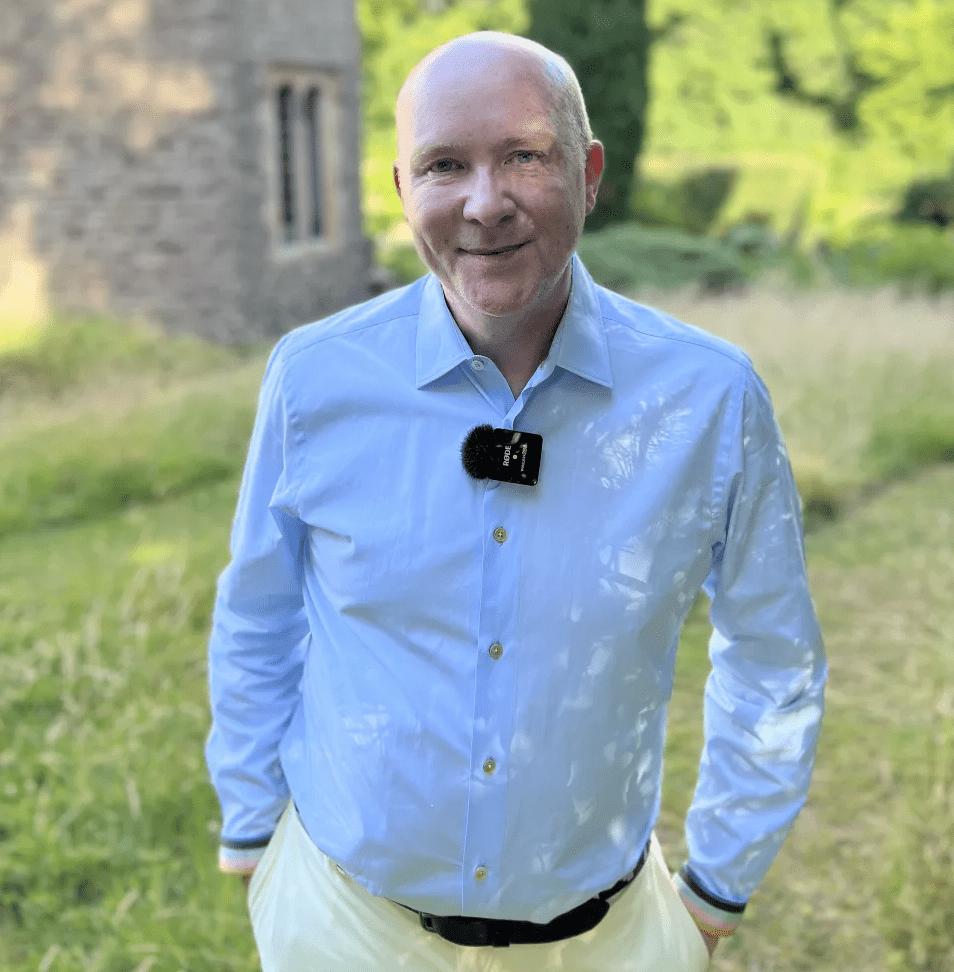Gays at Work: Mok, Historian
We’ve all sat through years of history lessons. The Romans, Tudors and World Wars are covered. Yet, no lesson on queer history. Thankfully, historian Mok O’Keffe is trying to change this. Through his YouTube videos, he explores queer history, peering through the gaps to locate our LGBTQ+ ancestors. Before he jetted off on holiday, I caught up with Mok about his work, his PhD, and queer history – all from the comfort of his castle.
‘Who knew you could do a PhD in country house studies? I didn’t intend to study it through an LGBTQ+ lens at first’, he told me. Mok is currently completing his PhD at the University of Buckinghamshire. ‘I grew up visiting various National Trust houses with my parents; I always loved them and, to be honest, I had expected I’d write about topiary gardens and cushions.’ I shared my own experiences: weekends at stately homes, jumping up and down the stairs of grand manors à la The Sound of Music. ‘Yes, exactly. But it wasn’t until I started researching the people in these houses, the people drawing maps and signing treaties, that I understood there was a queer perspective.’
Through his studies, Mok has worked to uncover the LGBTQ+ history that populates the castles and manors in the UK. ‘I loved those houses as a child, but I never saw myself represented in them. They were just aesthetically pleasing. But once you begin peering through cracks, you can begin to discover LGBTQ+ people throughout time. I think of it as a hidden and forbidden history.’
Mok had various examples on hand. We talked about James I and his correspondence with the Duke of Buckingham, how they referred to each other as husband and wife.
We talked about the Georgianna, Duchess of Devonshire (think Keira Knightley’s The Duchess) and her female friendships. ‘We read a lot about close female friendships during Georgianna’s time, even called ‘romantic friendships,’’ Mok explained. ‘But when they talk about being bound or beholden to each other, it does make you think.’
As fascinated as I was by Mok’s depth of knowledge, I had to ask: why discovering and talking about LGBTQ+ history is so important? Surely, history is history. ‘If you’re not including LGBTQ+ people then it is not a full history. People and whole lives can be, and have been, rewritten or ignored. Naturally, there is a specific impact on the present LGBTQ+ community. I believe that if you can’t see your history as a community, it’s hard to see your future.’
‘There is also a mental health aspect. Many of these people couldn’t live openly; this had an impact on how they lived, on their mental health. Look at Lord Castlereagh. A politician, intrinsic in defeating Napolean, who was blackmailed for being a homosexual. Eventually, he died by suicide.’ An awful page in queer history, but as Mok said, it opens up an interesting discussion. ‘What I am really interested in is how much of these individuals’ – James I, Georgianna, Lord Castlereagh – sexual makeup influenced their mental health and their behaviours.’
A valiant quest with interesting ramifications. But every quest has its obstacles. Talking about LGBTQ+ history on Gay Aristo (Mok’s YouTube channel), it does attract a certain amount of criticism. Varying from your trolling to Mok receiving death threats and photos of people using rainbow flags in the toilet. ‘It’s bad, but it’s par of the course when sharing things online,’ Mok said. ‘But it’s not going to stop me.’
Part of the problem is the misunderstanding that inclusivity of others requires the exclusivity of someone else. ‘I’m not here to deny anyone their right to live how they wish. Some people don’t understand that my right to be represented and to be included does not take away from theirs.’ This includes history and academia.
Of course, trolls are only one of the roadblocks. Trying to find and decipher evidence of LGBTQ+ individuals is a challenge in itself. ‘The burden of proof is left to us, to suggest that this lord or lady could be queer. We have to look at letters and personal effects. We have to fill in the gaps and ask ourselves ‘could they?’’
Families would destroy or remove anything that might suggest an ancestor was queer. Even Georgianna’s letters were heavily edited, Mok pointed out. The mere mention of homosexuality was enough to cast doubts and destroy reputations.’
Mok shared one example of queer history being edited. Nowadays, Casanova has become synonymous with a great seducer of women. Yet, his biography mentions two affairs with men, including the one that got him kicked out of seminary. Not exactly the red-blooded conqueror we’ve been told about.
Even with historic erasure, Mok and I as two gay men can see ourselves in history a lot more than lesbians, for example. We discussed how gay men are over indexed within the gay community, historically and presently. ‘It’s something I really want to explore and work with the lesbian community on. There are urban legends about Queen Elizabeth or Queen Victoria refusing to outlaw lesbianism because they just couldn’t believe it thing existed. And of course, the laws were written by men who felt the same way,’ Mok told me. ‘It is laws, trials and legal documents that account for male homosexuality through history. Male homosexuality is a history of criminality; female homosexuality is an almost non-existent one.’
I wanted to ask Mok about his work in academia, how his efforts to reveal queer history have been received. Initially, I thought of images of bearded be-tweeded men, huffing and puffing with shock at his proposals. Turns out, I couldn’t have been more wrong. ‘I’ve had no issues with experts or other academics. After all, academia is about uncovering and revealing. Everyone’s been excited about my work. The general consensus – this is a story that hasn’t been told.’
Mok talked about his work with the society of apothecaries. ‘They were excited, it was something new. I was working with archivists, going through records. From the outset they were very honest. They didn’t know if any members or masters were gay, they don’t know if or how much of it was recorded. But it was something we could explore together.’
Our conversation turned to a subject we’re both passionate about: LGBTQ+ inclusive education. Mok’s videos are entertaining, educational and very accessible; he told me about schools using his material in class.
‘I grew up during Section 28 so there was never any mention of homosexuality. Even when we learnt about Lord Castlereagh and his suicide, we were never told why. I only remember the teacher making a derogatory comment.
‘Now, I get messages from teachers, parents and students who have found my channel. One teacher told me that my videos were the only thing that got her sixth form class to pay attention. Another school reached out to me and I made some bespoke content for them, asking what they wanted to know about. They asked who the first lesbian was; I told them about Sappho.’
While Mok’s content is used alongside current curriculum, we agreed that LGBTQ+ issues should be integrated into lessons. ‘I think the conversation needs to be student-led. On subjects like this, I’ve seen student-led teaching be effective. They’re things the students want to learn so they’ll want to engage. We also have to think about the teachers: if and how they’ve been equipped to teach LGBTQ+ themes. I believe, as we continue to have more conversations about colonialism, race and empire, LGBTQ+ issues would complement these discussions.’
And it’s not just in the classroom that Mok and his work makes an impact. Not having many queer adults in his life, Mok is over the moon that he can be that for young people. Unless you count Miriam Margolyes. ‘I did a bit of acting when I was younger. Once I did a radio play with Miriam Margolyes. She was fantastic, so kind and confident. And a lesbian! For me, growing up in suburban London, it was amazing to see.
‘One mum contacted me and told me her daughter had come out as a lesbian. I think she was a bit unsure what to do. Their solution was to watch my videos together. Those kinds of messages really counterbalance the hate.
And it is getting better. The fact that we can have these conversations, that Mok can make his videos attest to this. Our learning, our understanding of history, and our media is moving in the right direction. ‘All I had when I was younger were films like Maurice. Looked lovely, but I just couldn’t see myself in it. Now, young people have amazing things like Heartstopper. I wonder what historians will make of it 100 years from now?’ Let’s hope people are like Mok are around to tell us.



